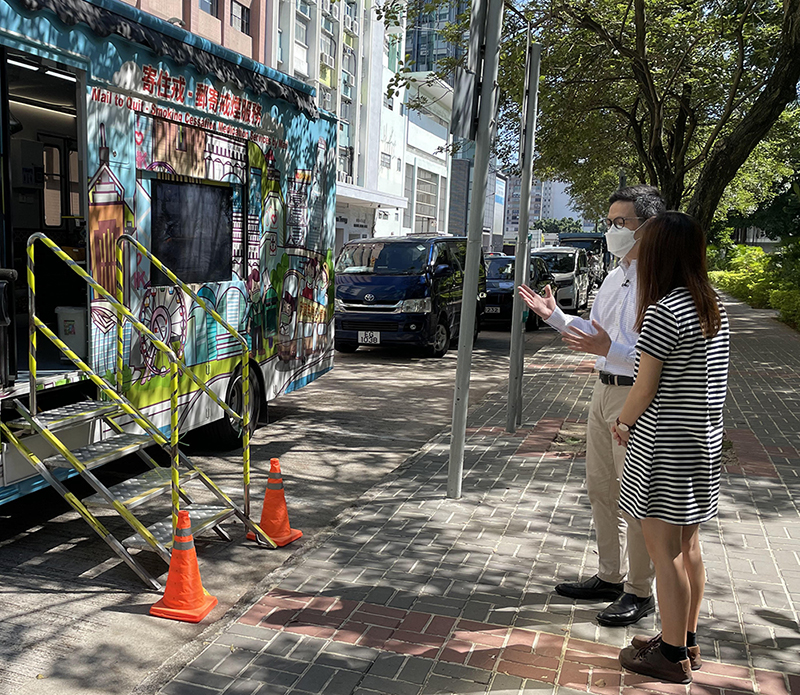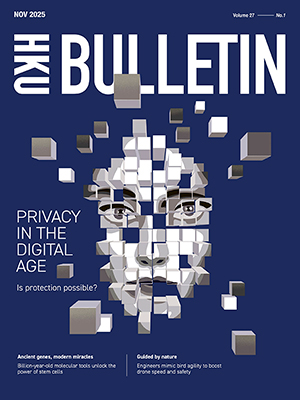November 2022 | Volume 24 No. 1
Snuffing out Alternative Tobacco Products
E-cigarettes and other ATPs have presented a challenge when it comes to controlling tobacco use. On the one hand, in the United Kingdom, the National Health Service touts them as a stepping stone to quitting traditional cigarettes. On the other hand, the World Health Organization has declared them to be harmful to health.
Research by HKU’s School of Nursing has helped provide definitive evidence in that debate and shown that ATPs can be most definitely harmful to health. Their work convinced the Hong Kong government and legislators to ban their import, promotion, manufacture and sale here as of April 30, 2022.
“We have been very worried about e-cigarettes and other ATPs because we find many new smokers are starting to use these. Our research findings show that ATPs cannot help with quitting and may actually be a barrier for smoking cessation. Their use is also associated with respiratory risks or symptoms in adolescents and children,” said Dr Kelvin Wang Man-ping of the School of Nursing and one of the leaders of the smoking cessation research team.
In fact, the synthetic chemicals used in e-cigarettes can penetrate deep into the lung, causing inflammation and getting trapped there. This can cause permanent damage in young smokers, he said.
The School’s work on ATPs is part of a two-decade long programme that includes providing research, outreach and policy advice on tobacco control to reduce the harm caused by smoking.

‘Tobacco Endgame: Zero Hazard · Smoke-free Generation’ publicity programme to echo the World No Tobacco Day on May 31 and World Health Organization’s appeal to draw global attention to the tobacco epidemic and the preventable death and disease it causes.
Hardcore smokers remain
While Hong Kong has one of the lowest smoking rates in the world, at 9.8 per cent, that still amounts to about 600,000 people. “This is still a big health problem. Smoking in general will shorten life expectancy by 10 years. One in two smokers will die prematurely and for smokers who start at an early age, two out of three will die early,” Dr Wang said. “But it is difficult to get the hardcore smokers to quit.”
That has not stopped the School of Nursing from trying. They have worked with the School of Public Health to regularly survey students in more than 200 primary and secondary schools and conduct other surveys of adults over nearly 20 years to monitor their tobacco use and exposure. The findings have, among other things, confirmed that increased taxation on tobacco products reduces youth smoking and that respiratory symptoms are similar between cigarette smokers and e-cigarette users and highest among dual users. Surveys of both youths and the general population confirmed that e-cigarettes do not help people quit conventional cigarettes.
What does help people quit, the School has found, is proactive outreach. Its smoking cessation research team recruits smokers to try out interventions and sustains contact with them through WhatsApp in the annual Quit-to-Win campaigns organised by the Hong Kong Council on Smoking and Health. Targeted outreach programmes have also been successfully implemented for new fathers and women smokers, and in hospital emergency rooms.
“This is unique in the world because most research on smoking cessation focusses on the clinical setting. But in the community, smokers are not that ready to quit, they’re still healthy. We are pioneering in grabbing opportunities to help this group quit,” Dr Wang said.

Tung Wah Mobile Smoking Cessation Clinic provides assessments and medications for smoking cessation, encouraging smokers to take the first step toward a smoke-free lifestyle.
Toward a tobacco endgame
The team is working on multiple large-scale randomised controlled trials to advance the effectiveness of smoking cessation interventions, including providing shortcourse nicotine replacement therapy, an artificial intelligence chatbot, and real-time assessment of smoking behaviours. The team’s impact in promoting smoking cessation in the community was selected by the University Grants Council to be presented to the public in promotional videos and awarded the American Academy of Nursing’s Edge Runner 2022.
The School has also been active in applying evidence to support tobacco control policies. Its work was cited by the government in its proposals for tobacco taxation, extensions of smoke-free areas and the e-cigarette ban.
There is now talk of a ‘tobacco endgame’. The common consensus here and around the world is that once tobacco use gets to five per cent or less in the population, then legislation can be introduced to ban it. Options could include a ‘smoke-free generation’ in which cigarette sales are banned to anyone born after a certain year, dramatically increasing tobacco tax, banning smoking in all places, gradually banning the sale of tobacco products and other measures. “But it is very challenging to further reduce Hong Kong’s smoking rate by another 4.8 per cent in a short time period,” Dr Wang said.
However, advocates have one thing on their side: “The tobacco industry is an obvious enemy. It’s pretty rare to have this in public health. The tobacco industry is lobbying everywhere around the world. We are like small people coming up against a giant.” But sometimes, small people win.
Our research findings show that alternative tobacco products cannot help with quitting and may actually be a barrier for smoking cessation.

DR KELVIN WANG MAN-PING

